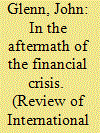| Srl | Item |
| 1 |
ID:
131704


|
|
|
|
|
| Publication |
2014.
|
| Summary/Abstract |
This article examines the financial reforms that have been undertaken through two perspectives on risk: that of Beck's world risk society and an alternative Foucauldian approach. The former argues that, catastrophes such as the recent financial crisis will induce a political shift towards a cosmopolitan form of statehood. Yet, the lack of radical reform since the financial crisis would suggest otherwise. The article therefore argues that what we are witnessing is best understood in terms of reflexive governance in which the various rationalities of risk are reassessed and strengthened in order to avoid a similar occurrence in the future. Moreover, in response to the uncertainty that surrounds such rare events, more intense forms of surveillance have been adopted with the objective of pre-empting any future crisis. Yet, for various reasons, the reforms remain rather limited and the new rationality of pre-emption is unlikely to prevent further crises from occurring in the future.
|
|
|
|
|
|
|
|
|
|
|
|
|
|
|
|
| 2 |
ID:
109811


|
|
|
| 3 |
ID:
106623


|
|
|
|
|
| Publication |
2011.
|
| Summary/Abstract |
The great aid debate pits those who are radically opposed to foreign aid against those who champion its managerial reform to achieve greater aid effectiveness. This article offers an analysis of the debate by introducing a heuristic distinction between aid 'radicals' and aid 'reformers'. The radical position is notable as it uncharacteristically unites neoliberals and neo-Marxists against foreign aid, while reformers espouse the tenets of managerialism as an ideological and practical vehicle for aid's improvement. Radicals remain sceptical and suspicious of reformist managerial utopias, while aid reformers see little value in radical nihilism. The paper calls for an end to the great aid debate by moving to a discussion of foreign aid that intertwines both radical and reformist perspectives. The 'radical reform' of foreign aid is both desirable and achievable so long as aid is re-theorised as a contested, commonsensical, contingent and civically oriented endeavour.
|
|
|
|
|
|
|
|
|
|
|
|
|
|
|
|